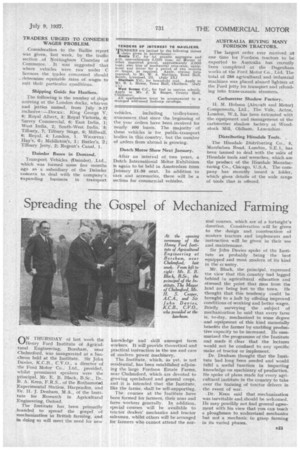Spreading the Gospel of Mechanized Farming
Page 31

If you've noticed an error in this article please click here to report it so we can fix it.
Or-IN THURSDAY of last week the Ford Institute of Agricultural Engineering, Boreham, near Chelmsford, was inaugurated at a luncheon held at the Institute. Sir John Davies, K.C.B., C.V.O., a director of the Ford Motor Co., Ltd., presided, whilst prominent speakers were the principal, Mr. E. B. Black, B.Sc., Dr, B. A: Keen, F.R.S., of the Rothamsted Experimental Station, Harpenden, and Dr. H. J. Denham, M.A., of the Institute for Research in Agricultural Engineering, Oxford.
The Institute has, been primarily ,founded to spread the gospel of mechanization in British farming, and in doing so will meet the need for new
knowledge and skill amongst farm workers. It will provide theoretical and practical instruction in the use and care of modern power machinery.
The Institute, which, as yet, is not residential, has been established adjoining the large Fordson Estate Farms, near Chelmsford, which are devoted to growing specialized and general crops, and it is intended that the Institute, like the farms, shall be self-supporting_
The courses at the Institute have been formed for farmers, their sons and farm workers generally. In addition, special courses will be available to tractor dealers' mechanics and tractor salesmen, whilst others will be arranged for farmers who cannot attend the nor
mal courses, which are of a fortnight's duration. Consideration will be given to the design and construction of modern tractors and implements and instruction will be given in their use and maintenance.
Sir John Davies spoke of the Institute as probably being the best equipped and most modern of its kind in the ccuntry.
Mr. Black, the principal, expressed the view that this country had Jagged behind in agricultural education and stressed the point that men from the land are being lost to the town. He thought that this tendency could be brought to a halt by offering improved conditions of working and better wages. Briefly surveying the subject of mechanization he said that every farm is, to-clay, mechanized in some degree and equipment of this kind materially benefits the farmer by enabling productive capacity to be increased. He summarized the programme of the Institute and made it clear that the lectures would not be confined to any specific make of tractor or implement.
Dr. Denham thought that the Institute had long been needed and would fulfil a useful function in imparting knowledge on machinery of production. He spoke of plans made for every agricultural institute in the country to take over the training of tractor drivers in the event of war.
Dr. Keen said that mechanization was inevitable and should be welcomed. He may possibly not find general agreement with his view that you can teach a ploughman to understand mechanics but not a mechanic to grasp farming in its varied phases.




















































































